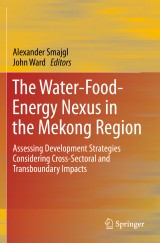Details

The Water-Food-Energy Nexus in the Mekong Region
Assessing Development Strategies Considering Cross-Sectoral and Transboundary Impacts|
53,49 € |
|
| Verlag: | Springer |
| Format: | |
| Veröffentl.: | 18.05.2013 |
| ISBN/EAN: | 9781461461203 |
| Sprache: | englisch |
| Anzahl Seiten: | 231 |
Dieses eBook enthält ein Wasserzeichen.
Beschreibungen
This Brief provides a cross-sectional analysis of development-directed investments in the wider Mekong region. The wider Mekong region includes Laos, Cambodia, Thailand, Vietnam, Myanmar, and the Chinese province of Yunnan. Evidence highlights that a few critical dynamics, including human migration, natural resource flows, and financial investments, generate a high level of connectivity between these countries. Such high levels of connectivity increase complexity and the potential for ripple effects of national decisions. The emerging links between countries can unfold in financial investments, migration, or the flow of resources. As these links intensify the regional connectivity increases and over time a highly connected region can emerge, as experienced by the Mekong region. This Brief also contains a chapter at the end of the book featuring numerous charts and diagrams further illustrating the impact of development activities in the area.
Mekong Region Activity.- Water Sector Analysis.- Food Security In the Greater Mekong Subregion.- The Energy Sector.- Livelihoods and Migration.- Land-Use Change.- Mining.- Cross-Sectorial Assessment.
Alexander Smajgl is researcher at CSIRO Ecosystem Sciences, Queensland, Australia.
<p>This book provides a cross-sectoral, multi-scale assessment of development-directed investments in the wider Mekong Region. The wider Mekong Region includes Lao PDR, Cambodia, Thailand, Vietnam, Myanmar and the Chinese Province of Yunnan. This book gives important insight into how future sustainability will depend on the development of effective governance mechanisms at the level of the Mekong region. Evidence highlights a limited set of critical dynamics that generate a high level of connectivity between these countries, including human migration, natural resource flows and increasing levels of private and State financial investments. Besides regional connectivity, this assessment considers cross-sectoral implications, in particular those between the water, food and energy sectors. The majority of nationally planned and implemented development decisions in the wider Mekong Region aim for either improved water access, increased energy supply or improved food security. Investments in any of these three sectors are critical as they are closely linked, harbouring potential trade-offs and unintended side effects.</p><p> </p><p>Successfully managing the water, food and energy nexus demands an understanding of direct and indirect connections. A few identified connections are direct trade-offs, for example the use of water for either food or energy crops. Other connections are indirect and their estimated magnitude suggests their critical importance. Identified nexus criticalities include fish stock management, land tenure, risk management of monoculture plantations and migration dynamics. The sustainability of the wider Mekong region will partly depend on how successfully these processes can be managed. Managing nexus criticalities, in contrast to specific sectoral investments, represents an alternate and potentially effective locus of policy intervention and initiative. Using case studies that include mainstream dams in the lower Mekong basin, water diversions between Lao PDR and Thailand, investments in response to rising sea level, this volume provides critical information for researchers and policymakers. </p><p> </p><p>The research was generously funded and supported through the AusAID CSIRO Alliance.</p><p> </p>
<p>Provides a cross-sectional analysis of development-directed investments in the wider Mekong region</p><p>The wider Mekong region includes Laos, Cambodia, Thailand, Vietnam, Myanmar, and the Chinese province of Yunnan</p><p>Includes supplementary material: sn.pub/extras</p>
Diese Produkte könnten Sie auch interessieren:

Digitale Transformation und Nachhaltigkeit in der globalen Finanzwirtschaft

von: Tim Alexander Herberger

89,00 €















